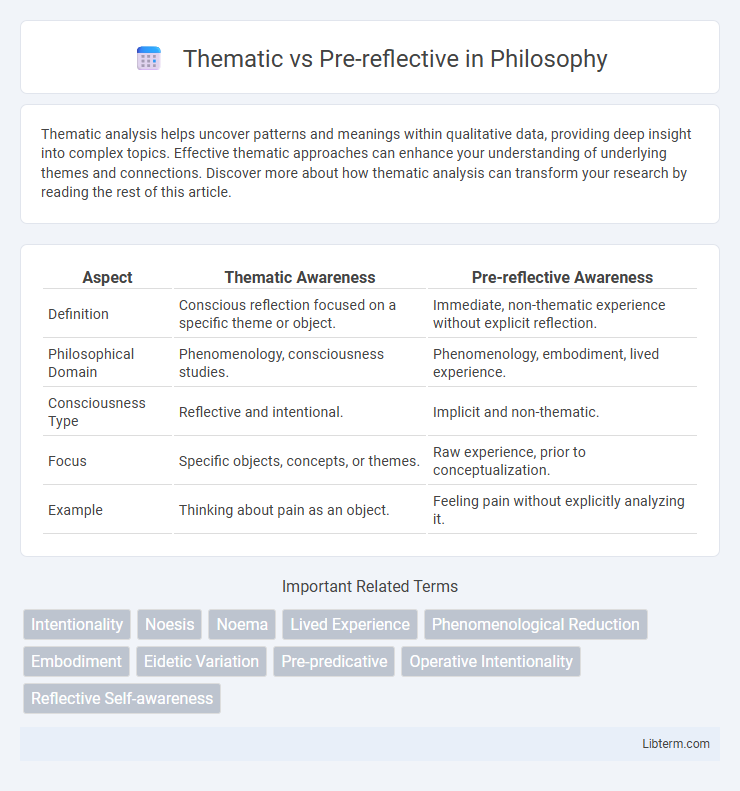Thematic analysis helps uncover patterns and meanings within qualitative data, providing deep insight into complex topics. Effective thematic approaches can enhance your understanding of underlying themes and connections. Discover more about how thematic analysis can transform your research by reading the rest of this article.
Table of Comparison
| Aspect | Thematic Awareness | Pre-reflective Awareness |
|---|---|---|
| Definition | Conscious reflection focused on a specific theme or object. | Immediate, non-thematic experience without explicit reflection. |
| Philosophical Domain | Phenomenology, consciousness studies. | Phenomenology, embodiment, lived experience. |
| Consciousness Type | Reflective and intentional. | Implicit and non-thematic. |
| Focus | Specific objects, concepts, or themes. | Raw experience, prior to conceptualization. |
| Example | Thinking about pain as an object. | Feeling pain without explicitly analyzing it. |
Introduction to Thematic and Pre-reflective Concepts
Thematic concepts involve structured, reflective thinking that organizes experiences around specific themes or ideas, enabling deeper cognitive analysis. Pre-reflective concepts refer to immediate, non-discursive awareness that precedes explicit reflection, capturing raw, intuitive experience. Distinguishing between thematic and pre-reflective modes enhances understanding of consciousness and cognitive processing in phenomenology and cognitive science.
Defining Thematic Reflection
Thematic reflection centers on identifying and analyzing underlying themes in experiences to gain deeper understanding, contrasting with pre-reflective awareness that occurs without explicit categorization. It involves a deliberate cognitive process where individuals critically examine their thoughts, emotions, and actions to derive meaning. This reflective practice enhances self-awareness and informs future decision-making through structured thematic insights.
Understanding Pre-reflective Experience
Pre-reflective experience refers to the immediate, non-conceptual awareness one has before engaging in conscious reflection, capturing the raw, lived sense of phenomena. Unlike thematic experience, which involves deliberate analysis and categorization, pre-reflective experience is characterized by a direct, tacit understanding that shapes perception and action intuitively. Understanding pre-reflective experience is crucial for exploring foundational aspects of consciousness, as it reveals how meaning and intentionality arise prior to explicit thought.
Key Differences Between Thematic and Pre-reflective Approaches
Thematic approaches emphasize structured, conceptual analysis by identifying patterns and themes across experiences, often relying on reflective interpretation to organize meaning. Pre-reflective approaches focus on immediate, lived experiences without conscious reflection, highlighting how phenomena present themselves directly to awareness before analysis. Key differences lie in the reflective nature of thematic methods versus the embodied, immediate presence central to pre-reflective experiences.
Historical Context and Philosophical Foundations
Thematic reflection emerged from phenomenology's historical emphasis on intentionality and self-awareness, highlighting deliberate, structured analysis of experience shaped by Husserl and Heidegger. Pre-reflective experience, rooted in Merleau-Ponty's and Zahavi's work, stresses the immediate, non-thematic consciousness underlying perception and lived reality before conscious articulation. These philosophical foundations distinguish thematic reflection as an explicit cognitive act from the continuous, embodied flow characterized by pre-reflective awareness.
The Role of Consciousness in Each Perspective
Thematic consciousness involves explicit self-awareness and reflective thinking about one's experiences, enabling individuals to analyze and articulate their thoughts and emotions. Pre-reflective consciousness operates at a tacit, immediate level where awareness is direct and non-conceptual, allowing experiences to be lived without deliberate reflection. The role of consciousness in thematic perspective centers on deliberate introspection, whereas in pre-reflective perspective, it functions as an underlying, non-thematic presence essential for immediate experience.
Practical Applications in Psychology and Phenomenology
Thematic and pre-reflective modes of experience significantly influence practical applications in psychology and phenomenology by shaping methods of inquiry and therapeutic interventions. Thematic awareness allows individuals to explicitly reflect on their experiences, enabling cognitive-behavioral techniques that target conscious thought patterns and emotions. Pre-reflective experience, characterized by immediate, non-thematic consciousness, is crucial in phenomenological psychotherapy for accessing implicit bodily awareness and fostering authentic patient-clinician engagement.
Strengths and Limitations of Thematic Analysis
Thematic analysis excels at identifying, analyzing, and reporting patterns within qualitative data, offering flexibility across various research questions and datasets while providing rich, detailed insights into participants' experiences and perspectives. It may struggle with capturing the depth of pre-reflective, non-thematic experiences because it relies on themes that demand a certain level of reflection and interpretation, potentially overlooking subtle, raw, or tacit aspects of consciousness. Despite limitations in addressing pre-reflective states, thematic analysis remains powerful for organizing complex, articulated data into coherent, meaningful themes that facilitate understanding and communication of qualitative findings.
Challenges in Accessing Pre-reflective Awareness
Accessing pre-reflective awareness poses significant challenges due to its inherently implicit and non-conceptual nature, making it difficult to articulate or fully grasp using thematic reflection methods. While thematic awareness involves deliberate, explicit focus on experience, pre-reflective awareness operates as an immediate, tacit layer of consciousness that often eludes direct introspection. This ontological distinction complicates efforts in phenomenology and cognitive science to capture and analyze pre-reflective states without imposing reflective structures.
Conclusion: Integrating Thematic and Pre-reflective Insights
Integrating thematic and pre-reflective insights enhances the depth of qualitative analysis by combining structured interpretation with immediate lived experience. Thematic approaches systematically categorize data to reveal patterns, while pre-reflective analysis captures the spontaneous, non-conceptual dimension of consciousness. This fusion allows researchers to produce richer, more nuanced understandings that respect both conscious reflection and intuitive awareness.
Thematic Infographic

 libterm.com
libterm.com